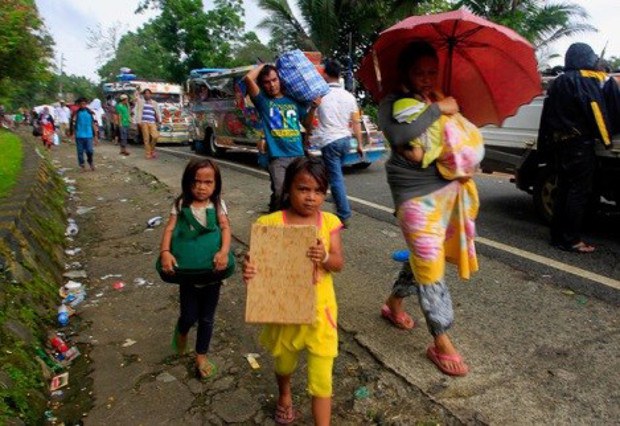Proposed ID System for Muslims in Northern Philippines Draws Flak
2017.07.10
Manila
 Civilians flee as Islamic State-linked militants and government forces battle one another in Marawi, a predominantly Muslim city in the southern Philippines, May 27, 2017.
Civilians flee as Islamic State-linked militants and government forces battle one another in Marawi, a predominantly Muslim city in the southern Philippines, May 27, 2017.
A measure being proposed in a northern Philippine province that would require minority Muslims to apply for identification cards is discriminatory and dangerous, local rights activists and legislators said Monday.
Police officials and local leaders last week discussed the possibility of implementing this policy in Tarlac province, amid fears that fighting between government forces and Islamic State-inspired militants in the southern city of Marawi could spread to other parts of the predominantly Catholic Philippines.
Officials said that a mandatory identification card system, which could help them track the movements of militants, was implemented in Paniqui city in the northern Philippines about three weeks ago. Police there want the measure widened to include other parts of the region, where about 25,000 Muslims live.
“That is locally initiated. That is not mandated by the (police) leadership,” Director General Ronald Dela Rosa, the nation’s police chief, told reporters, adding that he did not see anything illegal there. “It’s like police are just recording the people coming into your village.
The fighting in Marawi, which began on May 23, has emptied the city on Mindanao island of its 200,000 residents. Thousands of those who left are either in various evacuation camps, or have joined relatives staying in the northern Philippines or other parts of the country.
Carlos Conde, a Philippine researcher for New York-based Human Rights Watch, said the move being considered in Tarlac reflected “the government’s shortsightedness and lack of appreciation of Muslim cultural sensitivities.”
“Muslims in the Philippines have suffered not just from state and rebel violence but also from discrimination for far too long,” Conde told BenarNews. “This proposal needs to be rejected in the strongest terms.”
He said Muslims in the northern provinces do not speak for their brothers affected by the fighting in the south, and the government appears to be using this supposed initiative “to violate the rights” of Muslims in other areas.
“The Muslims-only ID system is blatantly discriminatory because it singles out a particular group,” he said, adding it could also lead to violations of a person’s basic rights, including equal protection of the law and freedom of movement.
About 6 percent of the country’s more than 100 million population are Muslims, most of them living in the southern Philippines, according to official statistics.
Religious profiling
The proposal for ID cards is a violation of a person’s basic constitutional rights, Sen. Win Gatchalian said Monday.
“It should be scrapped immediately,” he said.
An ID system would encourage hostility against Muslims in affected communities, and make them “susceptible to religious profiling” by the police, he said.
“Terrorism is an unholy crime against humanity that has been denounced by every religion in the world, including Islam,” Gatchalian said. “Our law-abiding Muslim brothers and sisters are not the enemy, and I will oppose any policy which implies that they should be treated with suspicion merely because of their religious beliefs.”
Mujiv Hataman, the governor of the Autonomous Region in Muslim Mindanao that includes Marawi, expressed alarm at the proposed ID system, which, he said, has apparently been implemented in Paniqui.
He warned that it set a “dangerous precedent” and served to alienate disaffected Muslims, and drive them into the hands of militant Islamic groups such as the Abu Sayyaf and the Maute gang.
“It could ignite anger among young Muslims who are primary targets for recruitment of extremist groups,” he said as he called for an “urgent dialogue” between local government, national law enforcement and security officials.
“We appreciate efforts outside Mindanao to fight terrorism, but, please, not through measures that could further worsen the current situation,” Hataman added.
Militants: A ‘clear and present’ threat
Fighting erupted in Marawi when troops and police moved in May to arrest Abu Sayyaf leader Isnilon Hapilon, the acknowledged IS leader in the Philippines. But they were met by a huge force of local and foreign militants from Southeast Asia and the Middle East, who took over the city in what has become the biggest challenge yet to the presidency of Rodrigo Duterte.
Despite almost daily aerial bombing runs and intelligence help from the United States and Australia, Philippine troops have failed to dislodge the fighters from Marawi, which now resembles a scarred ghost town.
The fighting has left 89 government forces, 379 gunmen and 39 civilians dead, with no immediate end in sight, the military said on Monday.
Military spokesman Brig. Gen. Restituto Padilla said that about 80-100 militants were still believed to be holding out in Marawi, even as their firepower appeared to have diminished.
“There are others who may have made their way out of the city because initially during the first week, we did not have a foolproof containment of the area and many of these [fighters] have escaped,” Padilla said.
Those who remain in Marawi “still pose a threat,” he said.
“They are not groups anymore,” he said. “They are just individuals or small groups, but still the threat that they pose is clear and present.”
Mark Navales in Cotabato City and Jeoffrey Maitem in Marawi City contributed to this report.







